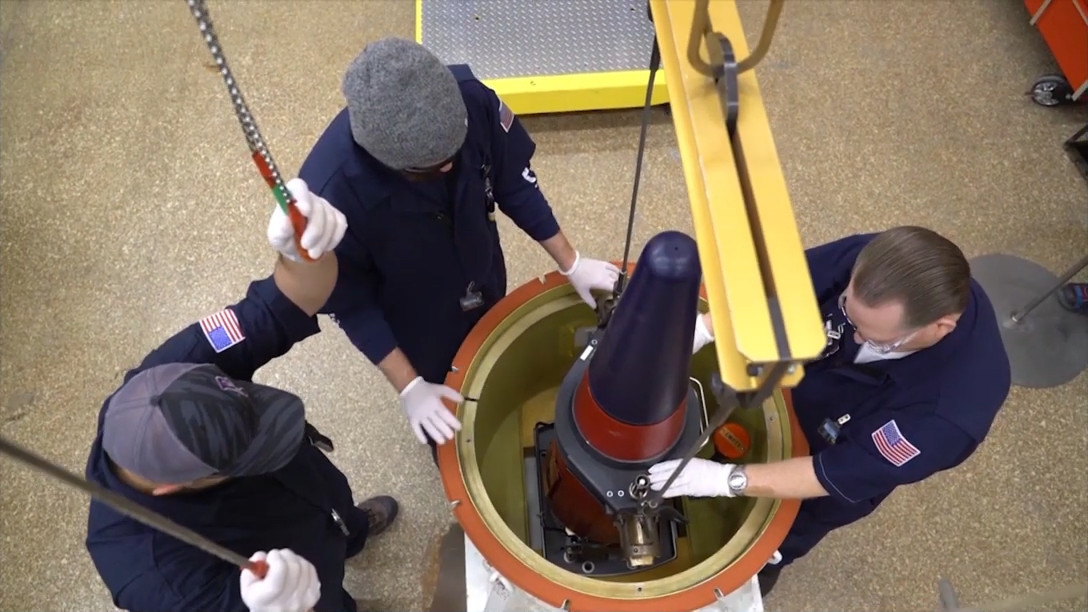The MOD has released the designation and name of the next UK nuclear warhead, the A21/Mk7 or Astraea. The disclosure came in the Defence Nuclear Enterprise Command Paper, released in March. Entitled ‘Delivering the UK’s Nuclear Deterrent as a National Endeavour’, the Command Paper provides an overview of the UK Defence Nuclear Enterprise (DNE). The DNE encompasses all aspects of the UK nuclear weapons programme, as well as its nuclear powered but conventionally armed SSN attack submarines.
Most of the information in the Command Paper is already in the public domain, but it contains a few details that were previously unknown, including the new warhead name. The A21/Mk7 designation and the name Astraea actually refers to the programme to develop the warhead, previously only known as the Replacement Warhead Programme, but this is likely a technical distinction and they will be assigned to the warhead when it is developed.
The Mk7 part of the designation refers to the aeroshell that would carry the warhead in flight, so A21 likely refers to the warhead itself. Names previously made public for the UK’s Trident warheads did not include an ‘A’ number, but there may be a numbering system that has not been made public for previous warhead generations. The warhead is described as being delivered ‘in parallel’ to the US W93/Mk7 warhead. Additional background information can be found in the 2022 NIS report ‘Extreme Circumstances’.
Mk4A and new reactor design
The Command Paper also confirmed that the upgrade of the UK’s current warhead stockpile to the Mk4A upgrade was completed in 2023. Named after its aeroshell, this upgrade replaced many of the non-nuclear components of the warhead, including the arming, fusing and firing mechanism, the gas transfer system and new high explosives. The Command Paper says that disassembling and variously recycling, reusing and disposing of parts from the old Mk4 stockpile is ongoing, although in practice most of the previous stockpile will have been refurbished as part of the upgrade.
A further revelation in the Command Paper was that development work has begun on a fourth generation UK submarine reactor. This would be a successor to the PWR3 design, which has yet to be deployed, but will power the Dreadnought and SSN-AUKUS submarines. The PWR3 is based on a US design, but it is not clear to what extent the new reactor, currently known as ‘Nuclear Propulsion Plant – X’, will follow US designs. According to the Command Paper, development will “span several decades” and is intended to deliver “a step change” in performance.
Skills and funding
The need to develop skills and increase the workforce has long been a concern within the nuclear programme, and this is also a major focus of the Command Paper. One section discusses the work of the Nuclear Skills Taskforce, a joint initiative between the MOD and the Department for Energy Security and Net Zero, which aims to support both the defence nuclear enterprise and the nuclear power sector. NIS understands that, alongside transparency, a goal of the Command Paper was to increase the desirability of the nuclear enterprise for prospective new workers.
Despite problems delivering the current nuclear weapon upgrades on time and to budget, the Command Paper doesn’t include any announcements, initiatives or funding that could address these issues. The only new funding is for a ‘transformation fund’ for Barrow-in-Furness’, which is intended to make the town where the UK’s submarines are built “an even more attractive place to live, work, and build a nuclear career”. At £20m a year for a decade, the fund is relatively modest compared to the funding gaps in the nuclear upgrade programmes and involves minimal up-front costs for the government. The only project named in the announcement was completion of the A595 Grizebeck Bypass road.
